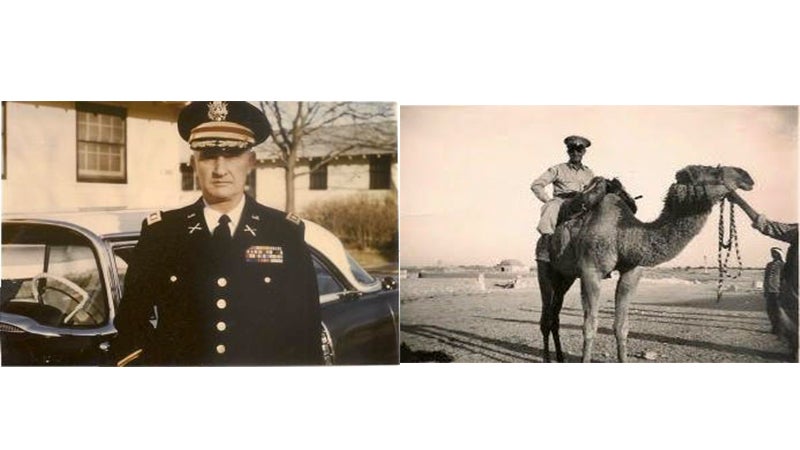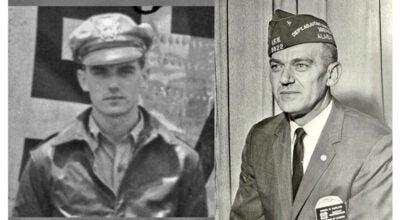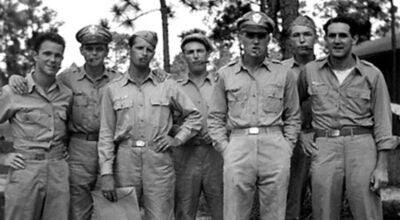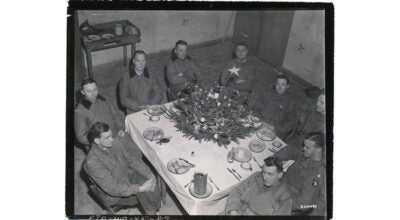Don S. Mathews, Lt. Col., Army National Guard, WW II, Korea Part 1
Published 2:00 pm Friday, August 25, 2023

- LEFT: Lt. Col. Don S. Mathews, postwar photo. [Photo: Charles Mathews] RIGHT: Major Don S. Mathews, North Africa photo, 1943. [Photo: Charles Mathews]
|
Getting your Trinity Audio player ready...
|
There is a bronze plaque located in the historic German city of Mannheim, Germany, which reads: “From this building on March 28-29, 1945, American Forces under the command of Major Don. S. Mathews conducted telephone conversations with City Official, Nikolaus Quintus in the administrative building of the electric, gas, and water works in K-5. He was assisted by Captain Franz S. Steinitz, U.S. Battalion Surgeon, who served as interpreter. These talks led to the peaceful turnover of the city of Mannheim to U.S. forces on Thursday, March 29, 1945. The prudent actions of those involved helped to prevent further destruction of the city.”
During the whole of WW II, not many U.S. soldiers were so remembered by an enemy that they had fought to destroy. Don Mathews was an American soldier who fought for his country but spent much of his life helping to establish peace.
Don Snowden Mathews was born in Andalusia, Alabama, on December 12, 1908. His parents were Pearl Maxwell and Charles Blackmon Mathews. The Mathews family would have three sons and two daughters. Don attended Andalusia schools and was active in sports and was an avid golfer. He graduated from Andalusia High School in 1926.
In June 1928, Don married Mary Elizabeth Benson of Andalusia. They made their home in Andalusia and Don went to work in his father-in-law’s hardware business. Mr. O.L. Benson, owned Benson Hardware which included a lumber mill, a brickyard and a foundry.
Don established several businesses of his own, including a furniture and appliance business, a Hudson automobile dealership as well as a dealership for Harley Davidson and Indian motorcycles.
Andalusia was home to an Alabama National Guard unit, the Headquarters Battery, 1st Battalion, 117th Field Artillery Regiment. Don joined the local guard unit in 1927, reportedly because the unit had horses and a polo field. The 117th had originally been a cavalry regiment but was converted into horse-drawn artillery when war was declared in 1917. On August 1, 1933, the 117th was converted from horse-drawn artillery to motorized artillery with the 105mm howitzer. By 1932, Don had been promoted to 2nd Lieutenant and by 1940, he was a Captain, commanding the local guard unit.
In November 1940, Don was forced to liquidate his businesses when the 117th Field Artillery Regiment was activated. The Andalusia guard unit was a part of the 31st Infantry Division, known as the Dixie Division because it was mostly composed of National Guard units from Alabama, Georgia and Florida. The 117th departed Andalusia in a convoy in December, bound for Camp Blanding, Florida. It was said that the whole town turned out to say goodbye. Their commanding officer, Captain Don Mathews, was in the lead vehicle. His 10-year-old son, Charles, rode along in a truck carrying enlisted men.
Charles returned to Andalusia for school while the 117th trained at Camp Blanding. After school was out in the summer of 1941, Don rented a home for his family in St. Augustine, about 50 miles from the camp. Don’s best friend was Dr. Lester C. O’Neal, a local physician and surgeon from Andalusia. Dr. O’Neal had also joined the 117th and was the battalion surgeon. The O’Neal family also rented a place in St. Augustine. The Mathews family and the O’Neal family visited often during the summer of 1941.
After the Japanese attack on Pearl Harbor, the 117th was sent to Camp Bowie, Texas, where they transitioned to the 155mm howitzer. Don’s unit was sent to Camp Barkley, Texas, then on to Camp Gruber, Oklahoma, on August 1, 1942. At Camp Gruber, the unit was re-designated the 933rd Field Artillery Battalion [FAB]. Don was promoted to Major in January 1943. His wife and son followed him to Camp Gruber which was near Muscogee. Charles attended Muscogee Junior High School in the seventh grade while they were there.
Don attended the Army Command and Staff School at Fort Leavenworth, Kansas, just prior to being deployed overseas. In August 1943, the 933rd departed for the European Theater. The battalion landed in Algeria in September 1943, along with their new 155mm howitzers. Don was the new Operations and Training Officer [S-3] for the 933rd FAB.
The 933rd trained for five weeks before traveling to Tunisia where they trained for another five weeks. In November 1943, the 933rd was deployed to Naples, Italy. After arriving in Naples, Don Mathews learned that his friend, Dr. [Major] Lester C. O’Neal, has been killed on November 7, near the town of Riardo, north of Naples.
General Mark Clark’s Fifth Army had been stalled in the area surrounding Monte Casino, some 67 miles north of Naples. The 933rd provided artillery support during the Monte Casino campaign from January through May 1944. In January 1944, the 933rd was assigned to provide artillery support to a French Expeditionary Force [FEC] which had joined the Fifth Army and moved into the area in Italy. The FEC was mostly a colonial army of African troops led by French Officers. The 933rd and Major Mathews were awarded two French Croix-de-Guerre citations for their work with the French Army.
Major Don. S. Mathews was also awarded the Legion of Merit for “exceptionally meritorious conduct in the performance of outstanding services in Italy from December, 2, 1943 to July 25, 1944.” The Legion of Merit is one of only two military awards to be worn around the neck, the other being the Medal of Honor.
In September 1944, the 933rd was deployed to southern France. They were assigned to French First Army Control and supported the French II Corps under the command of General Monsabert. In February 1945, the 933rd was heavily involved in supporting the “attack to eliminate the Vosges-Colmar pocket,” [Major Mathews’ words]. The Battle of the Vosges Mountains was for control of the Alsatian plains that led to the conquest of Strasbourg, which led to the eventual crossing of the Rhine River into Germany. End Part 1 John Vick
Sources will be given at the end of Part 2.
More COLUMN -- FEATURE SPOT





